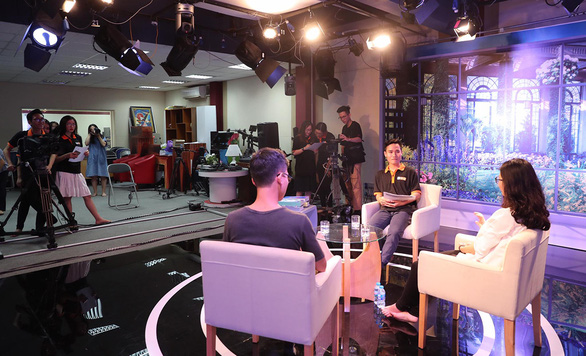
Students from the Institute of Journalism and Communication Training (University of Social Sciences and Humanities, Vietnam National University, Hanoi) during a practical television class - Photo: HL
Because schools are training "citizen journalists" to become "professional journalists".
The exam paper I will never forget
I will never forget the final exam for my 2007 graduate course in international journalism. The examiner, who was also my lecturer in the writing course, Peter Eng, was working for the Associated Press at the time. The exam was about 10 pages long, consisting of multiple-choice and open-ended questions. It was truly difficult to pass!
Peter warned us from the beginning that the course required a lot of effort. The exam was about journalistic writing, but we had to remember many principles such as what constitutes news, how to think about the topic, and many facts related to behavior, even considering the impact on the public. Many things from that exam have stayed with us throughout our teaching, research, and later lectures and presentations.
Many journalists and journalism educators consider the preceding decades to be the golden age of professional journalism because it was an era where abundant resources supported powerful news organizations and newsrooms. Journalists and newsrooms had a near monopoly on providing daily news.
When anyone can call themselves a "citizen journalist" or "editor-in-chief" of their own page, and the logos of Facebook or Google become familiar to more than half the world's population, the demand for reading news from mass media has cooled down.
Alan Rusbridger, with 20 years of experience as editor-in-chief of the prestigious newspaper The Guardian, recently warned: "For the first time in modern history, we are faced with the prospect of what society would exist without reliable news."
Adapt to change
Public attention and debate have shifted to digital media. Young people born after 1995, often associated with nicknames such as "Digital natives," "Instantly online age group," and "Dotcom children," have had a long childhood spent on social media and with access to electronic devices.
Mastering technology no longer requires as much time as it used to when entering university.
A lecturer at Boston University (USA) was talking to a colleague about how to teach journalism. He emphasized that it's not new technologies but traditional values in reporting that make a good journalist, elevating their work above the ordinary.
Teaching a range of skills that will become obsolete in five years is no longer a priority at journalism schools; instead, the focus is on building a mindset and teaching themselves for the long term.
Today, Donald Trump's Twitter account has nearly 75 million followers, and the New York Times has about 4 million paying subscribers. These two worlds are still running parallel.
This simply shows that as long as there is an audience, that medium will always exist, and journalists will always have a responsibility to their audience. Carl Bernstein once said, "Good journalism should challenge people, not just entertain them." Social media is doing, and will continue to do, the second part better.
Technology may grow alongside us, but perhaps the mindset of professional journalism still needs to originate in school and be honed in media organizations.
My exam questions 13 years ago touched upon the ethics and responsibilities of journalists, regardless of the medium or platform; the ability to verify information, regardless of the era; and sensitivity to information, regardless of the historical timeline.
|
The box no longer exists. Journalism education can only survive and succeed if it becomes more proactive in seeking change. It must become far more creative than it has been before. It's not a matter of thinking outside the box, because the box no longer exists. |
According to Tuoi Tre Online
Author:TTO
Newer news
Older news